103 Check-in Questions for Meetings
Table of contents

While check-in meetings can be one of the most effective ways to communicate progress, raise and solve challenges, and connect with other employees, these meetings need structure to be effective.
Designing well-structured meetings doesn’t have to be a weekly task either. Utilize the example goal- and task-oriented employee check-in questions for meetings below to get the most value from your next meeting, whether it’s with the whole team or one-on-one.
Why should you use check-in questions for meetings?
Meeting at a regular cadence is a critical part of ongoing performance management. They provide the foundation for supportive and productive working relationships, giving everyone room to express their thoughts and feelings, work through challenges, and get support.
Check-in questions are an easy way to ensure meetings with so many potential discussion topics are productive for all involved.
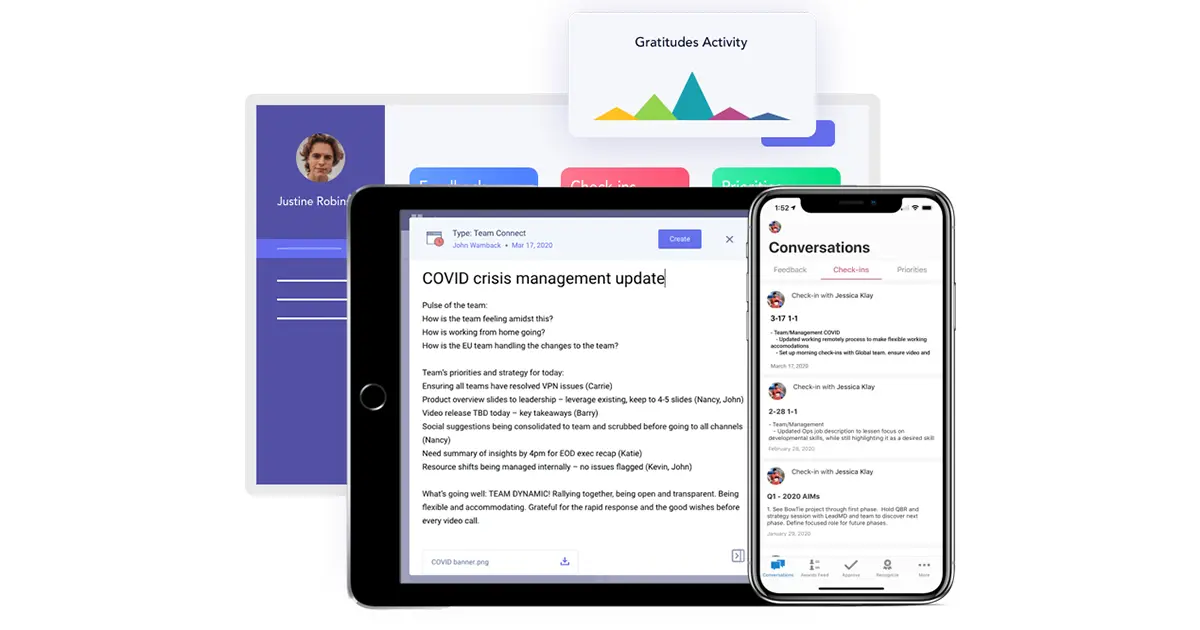
Learn more about Conversations®, the continuous performance management solution from Workhuman®.
Did you know that 65% of HR executives are seeking better quality manager-employee check-ins for feedback and coaching?
Workhuman's Conversations® solution is the tool you need. Enhance your interactions for more meaningful and effective employee engagement. Click here to discover how Workhuman can transform your feedback process.
In project-based meetings, check-in questions are a helpful way to gauge the progress and productivity rate of employees. They provide a framework for the discussion that keeps teams aligned and more efficient. If team leaders use the same questions week-to-week, participants can come prepared, ensuring the most important topics are always covered.
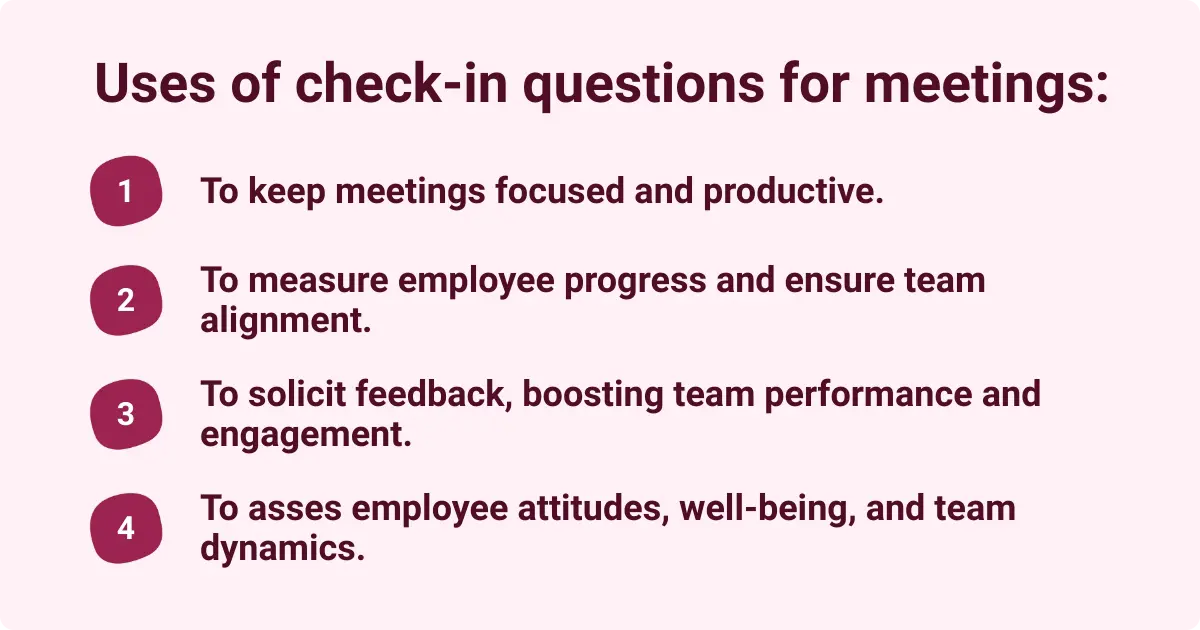
Open-ended questions are a great method for managers to solicit input and feedback regularly. This will ultimately improve your and your team’s performance, but it can also connect employees to their work in meaningful ways, increasing their engagement with it.
Questions can also be used to assess employee attitudes or guide conversations around wellbeing like work-life balance and team dynamics. You’ll be able to find out whether the workers are feeling disengaged and overworked or enthusiastic and fully productive.
This is especially important for virtual or remote workers. It’s easy to leave employees completing their tasks alone, but doing so can negatively impact the productivity of employees and their mental space.
What makes a check-in question good?
Great check-in questions stimulate conversation but should be answered quickly. It's all about finding a balance in your question’s predicted response.
When developing your check-in agenda, you don’t want your questions to necessitate a yes and no response. On the other hand, you don’t want answers that can become time-consuming stories.
Here are some ideal, general check-in examples to consider:
- What do you want to accomplish today?
- What is your greatest challenge at the moment?
- What work are you most proud of?
- If you were to receive some constructive feedback right now, what would you expect it to be?
- What tools could we provide you to better your job flow?
As you can tell, they’re inclusive. Employees from different departments and backgrounds can answer. Plus, they allow you to dig deeper into each employee’s motivations and thought process.
In the end, you want the questions to create an open and safe space where workers can communicate all their difficulties to you as a manager.
These back-and-forth discussions between you and your team build rapport and integral bond. Research from Gallup and Workhuman shows that employees who don’t have meaningful connections with their coworkers are up to 5x as likely to be looking for a new job and 5.5x more likely to be suffering.
By prioritizing meaningful connection with thoughtful check-in questions, you’ll be boosting morale, productivity, and a healthy workplace environment.
What do you talk about in check-ins?
Employee check-ins can discuss a variety of other topics. They can be project- focused, revolve around career goals, or even social discussions pertaining to personal non-work related news.
It’s always a good idea to start with a simple “How are you?” to start the conversation on a personal level. It also gives employees a chance to set the tone.
In one-on-ones, it can be especially helpful to let the employee drive the conversation. They may have pressing issues to discuss with you. If you have a specific goal or need to discuss it with them, it’s best to communicate that ahead of the meeting.
That said, it’s a good idea to have an agenda with a couple of questions for meetings. If you and your employee don’t have immediate concerns, you can use the session to ask questions about their workplace experience, professional development, and overall progress.
Alternatively, you can initiate a conversation about their perspective of the company as a whole. For instance, you can ask them what they would do differently if they were put in the CEO position. These kinds of topics build more vision and establish a better connection between the employees and the organization.
When should you do check-ins?
The timing of check-ins should completely depend on your workplace culture, the process of performance management, and the purpose of your meeting.
Generally, you will have multiple diverse types of check-ins within a given month. Larger groups may choose to meet once monthly, while individual teams or managers and employees may opt for a weekly meeting or biweekly sessions.
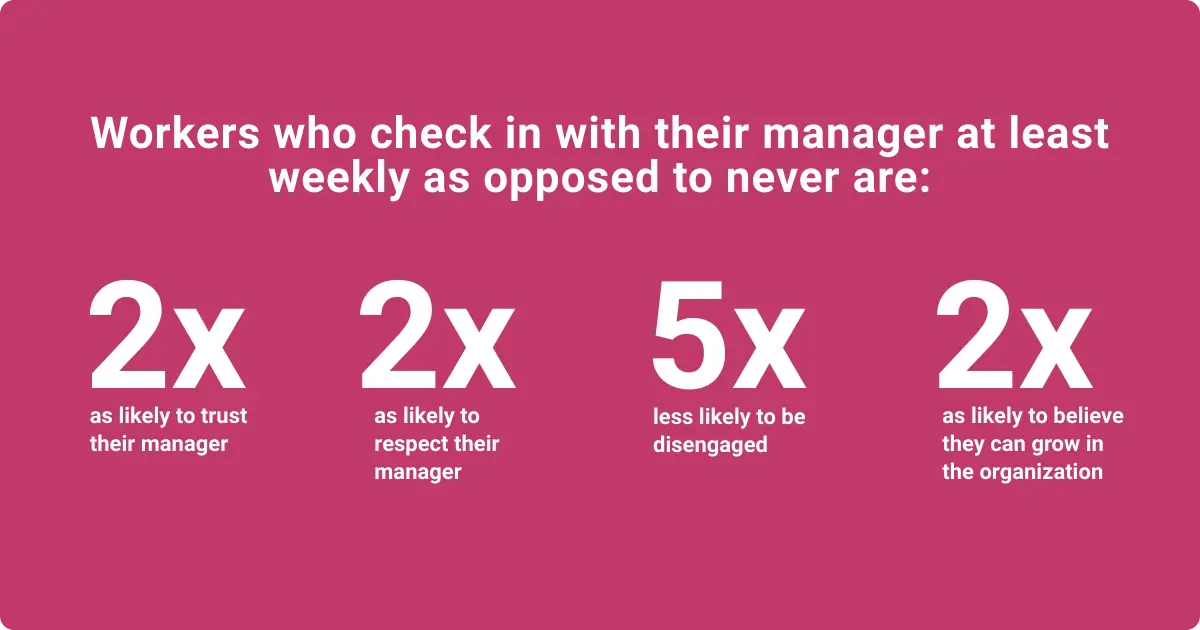
For this reason, all of these need to be efficiently distributed throughout the month and be properly scheduled and structured. If not, a lack of planning could make you lose sight of the overarching purpose of check-ins.
Employee effectiveness increases with the frequency of check-ins. Use these 12 helpful tips to have more positive check-in experiences.
To help you keep organized, here are 103 example questions for different types of check-ins:
Project and progress check-ins
In terms of projects, the right check-in questions can elicit crucial information regarding their progress and any issues faced.
Plus, they keep the team in check and make sure the project is steadily developing. That being so, check-in questions can vary in their implementation, where you can ask team members individually and as a group.
Questions for daily stand-ups
Daily check-in questions regarding a project help keep your employees on their toes. With each day, you may expect a progress update. Such questions include:
- What tasks do you want to achieve today?
- Are you currently facing any obstacles?
- What are you most looking forward to doing?
- What is your main priority for today?
- Do you need any help in executing a task?
This meeting type can quickly become tedious for your employees. Ask yourself if a daily routine check-in is necessary and, if so, for how long you’ll need them. Schedule a short meeting at the same time each day so employees can plan their workday around them.
Project check-in questions
Project check-in questions steadily change depending on which phase the employees are in. At the start of the project, you can ask check-in questions like:
- How do you plan to execute this project?
- Do you predict any incoming issues you may face during the project?
- How will you measure your project’s overall success?
- What are your short-term and long-term goals for this project?
- What is a part of the project you’re most looking forward to completing?
- What do you require from me to successfully execute this project?
As the project gets carried out, you can then begin to change your questions to something like:
- What current hurdles are you facing in the project?
- What should we stop or keep doing in the project?
- Are there any off-course actions in the project that you wish to share?
- If so, how have they impacted your workload?
One-on-one check-in questions
We’ve all been in group projects before. Oftentimes, individuals may be pulling more weight than their teammates. It’s worth addressing these concerns with informal or formal one-on-one check-in meetings.
These questions could include:
- How do you feel about your teammates?
- How has your day been so far?
- What is your workload like?
- Do you feel confident in your team’s performance?
- Is there any way we can assist you?
See also: Skip-Level Meeting Questions for Managers and Employees
Project wrap-up questions
Once the project is complete, it’s time to ask some reflective check-in questions that go as follows:
- What are you most proud of in this project?
- How has the project aligned with the company’s objective?
- What would you have done differently?
- Were you able to follow the project’s initial plan?
- If not, what went differently and why?
Their purpose is to give your employees the necessary feedback, supporting a high-performance management system to improve their future performance. Plus, these improvement ideas can be shared with other teams and departments when applicable.
Apart from the questions mentioned, you also want to provide praise for hard-working individuals in the project. Recognizing employees for their hard work is correlated with higher engagement and higher productivity – so it’s really a win-win for everyone.
Recognition works best when it is given regularly, just like check-ins. Aim to integrate recognition into your check-in meetings to make employees feel both supported and seen.
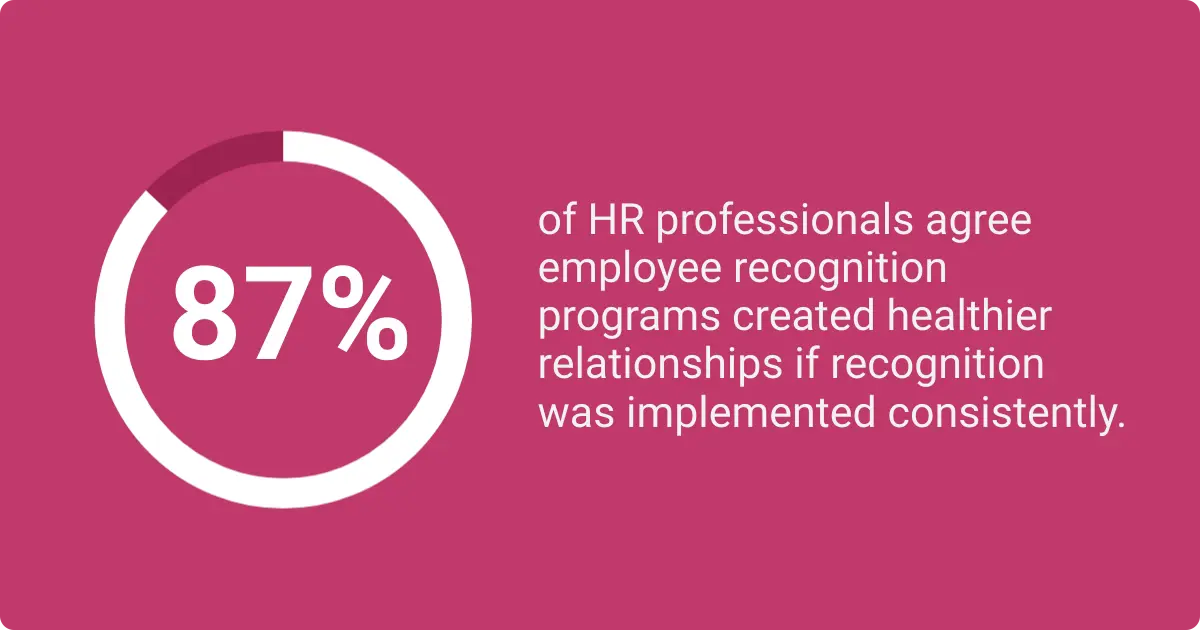
Questions for team meetings
As humans, we’re social creatures. You can’t expect employees to complete their tasks on a routine basis with no interaction. That’s where team check-in meetings come in. In a fast-paced work environment, we may often lose sight of each other’s progress.
According to the LeadDev article, " Building bridges with difficult co-workersOpens in a new tab", team meetings are an effective way for managers to foster stronger connections among coworkers. Additionally, they allow employees to feel both heard and seen rather than become cogs in a machine. That being said, here are some stimulating team questions you can ask in your next check-in meeting.
Team check-in questions
- What do you think is a missed opportunity in terms of collaboration?
- Which tasks are facing delays?
- Do you think we’re collaborating remotely well?
- Are you able to easily approach anyone on the team?
- What is a discussion topic you would like to address with the rest of the team?
- How can we improve our line of communication?
- What is everyone’s current workload like?
Team-building questions
Team-building is all about fostering a trustworthy relationship between you and your employees. You can ask questions like:
- Who is your biggest role model?
- What do you think are the most important qualities in a colleague?
- If you could swap roles with anyone in the company, who would it be?
- What are your pet peeves?
- What are your goals in your career?
- What would you say is your best attribute?
Questions for remote teams
Working remotely can often make us feel isolated. With no coworkers around, your employees may be more likely to be disengaged from their work. On the bright side, they’re more autonomous and eventually become self-ledOpens in a new tab at some point.
To keep track of your remote team members’ performance, you can check -in with questions like:
- How do you schedule your work routine?
- Would you feel more productive while working in an office?
- What is a struggle you continuously face while working from home?
- How often do you take breaks?
- How would you rate your work-life balance?
- Is there anything we can provide to help you complete your remote work?
Performance and development questions
One of the main purposes of check-in meetings is to check your employee’s overall performance and development level. These questions should provide your employee with a review of their work and how they’re doing overall.
Feedback check-in meetings
- Which task or project are you most confident in and why?
- How would colleagues and clients address your work?
- What are some hurdles you’ve experienced since our last check-in?
- How would you describe your work quality?
- What can we do to better improve your performance?
Coaching check-in questions
- What actions are you implementing that seem to be working?
- What are the actions that don’t?
- What steps are you taking to improve your work qualityOpens in a new tab?
- How effective have these steps been so far?
- What tools would you need from me to assist your action plan?
Goals check-in questions
- Which goals were you able to accomplish since our last check-in?
- How have we helped you achieve these goals?
- What better way can you achieve your goals?
- What are your long-term goals in this career?
- How were you able to contribute your work to achieve the company’s goals?
Growth and development needs
- Do you see yourself growing better in another department?
- What is the most challenging part of your growth?
- What are the necessary tools needed to improve your development?
- How have you advanced in your role since the past check-in?
- How have your colleagues assisted you on this path to growth and development?
Experience and culture questions
Company culture dictates the cooperation between employees and employers. According to TeamStageOpens in a new tab, over 46% of job seekers prioritize a company’s culture.
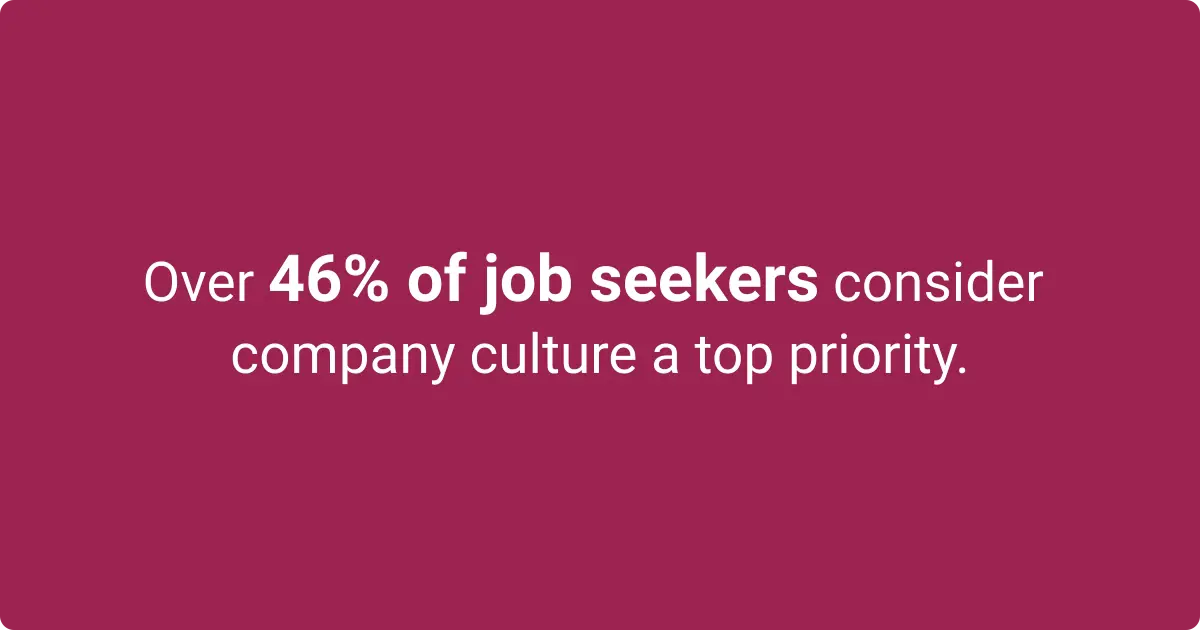
That being said, check-in meetingsOpens in a new tab surrounding experience allows you to grasp how well-suited your employees are to the company’s organizational culture. It also presents an opportunity to see how each employee is doing personally and adds a sense of humanity to your work culture, which is crucial for employee happiness.
Mindset check-in
- What is your current mindset towards work?
- What are your thoughts on the company’s organizational culture?
- What tasks are you able to fulfill out of your comfort zone?
- Do you feel hesitant about any aspect of work?
- Do you face any distractions from work?
Office environment check-in
- How close do you feel to your coworkers?
- Do you feel supported by your managers?
- What are your thoughts on your team?
- What’s your favorite part about the company culture?
- What would you like to see changed in your office environment?
Wellness and mental health check-in
- Are you happy?
- How often do you feel anxious?
- What excites you about work?
- What frustrates you at work?
- What aspect of work inspires you the most?
Work-life balance check-in
- Are you taking good care of yourself?
- Are you satisfied with your current work hours?
- Have you ever missed a personal event due to work?
- Do you often work overtime?
- How could we improve your work-life balance?
New employee check-in questions
Joining a new team can sometimes feel awkward. Some have compared being a new team member to joining a TV show mid-season.
To ease a new employee into the workspace, each coworker plays a part. A manager will do their best to keep checking in on them. Meanwhile, colleagues can try to familiarize their new coworkers with the workplace culture and patterns.
Here are some questions to consider in this situation.
- How has the company met your expectations so farOpens in a new tab?
- Do you feel welcomed by the team?
- What’s your favorite part about your position?
- What’s your least favorite part about your position?
- How would you describe the company’s culture so far?
Fun questions to ask in team meetings
Check-ins don’t always have to be so serious. Fun check-ins strengthen employee relations and are good for laughs, especially after a hefty project.
When a new employee joins, you can ask icebreaker questions at a team meeting. Out-of-the-box questions can be an easier method of making employees more at ease with each other than team-building activities, especially for virtual meetings.
Here are just a few fun check-in questions to get you started:
- If you had to work full-time in the last place you went on vacation, would you do it?
- If we had a team-building trip, where would you want to go?
- What is an interesting fact you recently learned?
- What kind of music do you listen to while you work?
- If you could find out one of the world’s mysteries, which one would it be?
- What’s your favorite pastime?
- What’s one thing we don’t know about you?
- What was your favorite subject as a student?
- What’s the weirdest email you’ve ever received?
- What was your first job?
- What was your dream job as a child?
- What’s your favorite TV show/movie?
- If you could time travel, which period would you choose to visit first?
- Would you characterize yourself as an introvertOpens in a new tab or extrovert?
FAQs
How do you run a team check-in?
Running team check-ins involves discussing progress in projects and tasks. You’ll also want to make sure every role is made clear to the team during a check-in. Initially, we suggest preparing your questions first.
You can divide the discussion into one topic at a time. Be sure to keep everything recorded to be able to follow up later on. Make sure the meeting is scheduled beforehand to avoid making meetings when they’re occupied.
What are some good warm-up questions?
Warm-ups are basically like ice-breaking activities to introduce new workers to the team. You can ask questions like-
- What is the best piece of advice you’ve received?
- What fictional place would you like to visit the most?
- What was your favorite game as a child?
How can Conversations® make check-ins more impactful?
Conversations® makes ongoing feedback easy by enabling anyone to request and receive feedback at any time. This ease drives frequent, high-quality check-ins informed by real-time feedback consolidated in one easy-to-use platform.
Instead of spending time gathering notes, you can walk into a check-in with all the information you need in one place, enabling you to spend valuable time directly engaging with your employee and supporting their needs.
To conclude
Interpersonal check-in questions widely range depending on their timing and purpose. For instance, fun check-ins ask informal questions and focus more on interpersonal connections. Meanwhile, a team project check-in carries a more serious tone to identify problem areas and how to solve them.
The most crucial step to structuring the best check-in questions is to make them thoughtful, specific, and inclusive.
People love talking about themselves – both professionally and personally. Take advantage of that with high-quality check-in questions.
About the author
Maeve Ginsberg
A wellness enthusiast and the mid-day walk’s #1 fan, Maeve champions work-life balance.
Having gone from a corporate job to self employment, Maeve has lived through countless working styles. This evolution forced confrontation of her own limiting beliefs, eventually breeding a completely individualized approach to work and productivity.
As a Senior Copywriter, Maeve often writes on workplace wellbeing and strives to advocate for all workers and leaders to find small yet significant ways to make their work lives healthier and more fulfilling.
Offline, Maeve enjoys testing new cuisines and hanging upside down off walls (also known as bouldering).